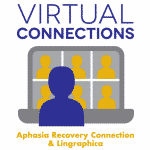Unlike many of the more common types of aphasia, primary progressive aphasia (PPA) is a type of frontotemporal dementia. As it’s a type of dementia, PPA cannot be cured. In general, it’s thought to be rare. It’s also likely that many people go undiagnosed due to unfamiliarity surrounding the condition, in addition to the often subtle nature of the early symptoms.
It’s important to remember that everyone is different, and the primary progressive aphasia stages can vary. Simply stumbling over a word is not cause for panic. But knowing the symptoms of PPA can help those with the condition to find help and develop strategies to improve or maintain communication abilities and slow the progression of some symptoms.
Early-Stage Primary Progressive Aphasia
The early stages of PPA are often subtle, and the symptoms are sometimes missed. Typically, these initial symptoms will appear in adults between 50-70 years old. These symptoms of PPA often present as difficulties with language and speech.
• Mispronouncing words
• Word-finding difficulty
• Trouble comprehending conversations
• Talking around words
• Slowed or interrupted speech
• Substituting letters that sound similar (e.g., “tance“ instead of “dance”)
• Difficulty reading
• Difficulty writing
• Spelling trouble
Middle-Stage Primary Progressive Aphasia
Due to the subtlety of the early symptoms, it’s possible for many years to pass without acquiring a diagnosis. The rate of decline is different from person to person. The symptoms of mid-stage PPA are similar to early-stage but more pronounced. Language and speech problems become obvious. In addition, changes in non-language abilities can occur but do not always. These can be subtle or more pronounced from person to person.
• Memory loss
• Difficulty maintaining attention
• Lapses in judgment
• Mood swings
• Personality changes
Late-Stage Primary Progressive Aphasia
In late-stage PPA, the gradual loss of speech and language will typically result in severely pronounced symptoms. Eventually, almost all patients with PPA lose their ability to speak, read, and write. Spoken language becomes incomprehensible. The non-language abilities like memory are often further impacted and impaired as the condition progresses.
• Complete loss of speech
• Inability to understand written language
• Inability to understand spoken language
How To Live With Primary Progressive Aphasia
No two people are the same. It’s important to consult with a doctor if you think you may have PPA. There is no cure for PPA. There are solutions that can allow some individuals to maintain or temporarily improve their ability to communicate for a duration of time. Augmentative and Alternative Communication (AAC) devices are tools that can help those with early- to mid-stage PPA symptoms communicate, practice their speech, and preserve their voice.
Losing your ability to communicate can be incredibly difficult. It’s important to take care of yourself and talk to a medical professional if you feel anxious or depressed, as these are treatable problems.

Lingraphica puede ayudar
Ayudamos a los adultos con discapacidades del habla y el lenguaje a reconectarse con familiares y amigos, mejorar la comunicación y vivir sus mejores vidas. Llamenos al866-570-8775 or visit the link below to get started.

Toda una comunidad a tu alcance
Conéctese con cientos de personas con afasia y sus seres queridos desde cualquier parte del mundo GRATIS. Haz clic en el botón de abajo para saber más.









Ppa can this be caused by a accident or diabetes I saw a questionnaire FOR Ppa my son is 45 ..
Thanks
I’m scared and depressed. I think I may have Primary progressive aphasia. I say the wrong word on a daily basis.
For example: I said to my sister “ please put the glass in the “ oven “. The intended word was “ dishwasher “ This started in May 2022 .
Sometimes I say the wrong word in my thinking mind – when I’m having an inner monologue. This happens more when I’m tired . Is this a symptom I should see a neurologist about ?
Hi Kim! It is best to talk to a doctor and discuss the concerns you have.
Hello,
I scheduled an appointment for neurologist that specializes in PPA , No appointment for a year. I am on schedule for next year. But just thought someone would have an answer to my question while I entire year.
Thank you,
KIM
Hi Kim! You can schedule a call to speak with a Customer Engagement Specialist to learn about our therapy and communication solutions. We would be happy to help!
I think this my be what my wife JULIETTE has …………..Paul…………..